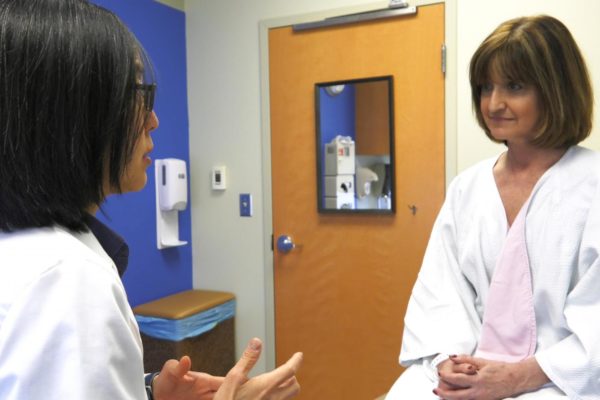AUSTIN, Texas — More than half of breast cancer patients undergoing mastectomy do not make an informed decision about reconstructive surgery that aligns with their personal goals, a new study reports. The research suggests that surgeons should work closely with patients to understand the underlying values and preferences of those they treat and to ensure a common understanding of advantages, disadvantages and risks of complication — a process known as shared decision-making.
Clara Lee, M.D., a breast reconstructive surgeon at The Ohio State University Comprehensive Cancer Center – Arthur G. James Cancer Hospital and Richard J. Solove Research Institute, is principal investigator of the study, published May 3 in the medical journal JAMA Surgery. Michael Pignone, M.D., chair of the Department of Internal Medicine at Dell Medical School at The University of Texas at Austin, mentored Lee at The University of North Carolina at Chapel Hill and is an author of the study.
The study measured participants’ medical knowledge about mastectomy and mastectomy with reconstruction. It also measured patients’ individual preferences. Key preference factors included breast appearance post-treatment, length of recovery time and complication risk.
“We found that less than half of the women had adequate medical knowledge about breast reconstruction and made a choice that aligned with their personal preferences. This is very concerning to us, because it means that some women did not get the treatment they truly preferred, and quite a few had more treatment than they preferred,” said Lee. “Many women were quite concerned about complication risks, but they didn’t actually know how high the risk was.”
The study found that only 43 percent of patients demonstrated an understanding of at least half of the important facts about reconstruction and made a choice that was consistent with their preferences. Understanding of surgical complications was particularly low, with only 14 percent of patients demonstrating strong knowledge of associated risks. There is a 16 to 40 percent chance of major complication in the first two years after surgery.
“The interesting thing is that these findings are not unique to breast reconstruction,” said Pignone, whose research is focused on improving medical decision-making, in part through the use of decision aids and other tools. “In other places where we’ve looked at decision quality, we see gaps in patients’ understanding of key information and poor alignment between the things they care most about and the treatments that they choose. It means that we need to do a much better job of providing decision support to patients so that the care they get is ultimately the care they want.”
Pignone, who worked with Lee on a program focused on cancer decision-making at UNC-Chapel Hill, is working to build a similar program in Central Texas in partnership with the LIVESTRONG Cancer Institutes of the Dell Medical School.
About the Study
The observational study, conducted in the breast clinic of the North Carolina Cancer Hospital and funded by the National Cancer Institute, sought to evaluate the quality of 126 adult breast cancer patients’ decisions about breast reconstruction after mastectomy. “High-quality” decisions were defined as those that demonstrated adequate medical knowledge of treatment choices — including associated risks — and that also matched with the patient’s specific goals and preferences for choosing whether to pursue reconstructive surgery.
Other collaborators include Allison Deal, M.S., and Ruth Huh, B.A., of Lineberger Comprehensive Cancer Center at UNC-Chapel Hill and Peter Ubel, M.D., of Duke University.




